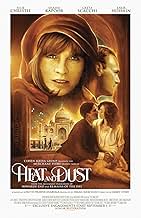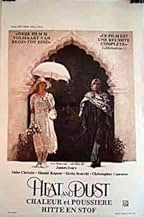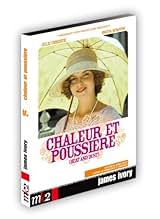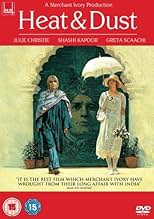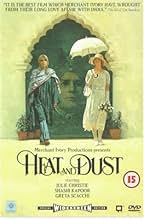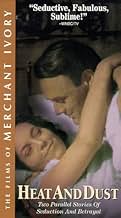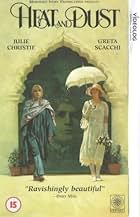ÉVALUATION IMDb
6,5/10
2,3 k
MA NOTE
Anne enquête sur la vie de sa grand-tante Olivia.Anne enquête sur la vie de sa grand-tante Olivia.Anne enquête sur la vie de sa grand-tante Olivia.
- A remporté le prix 1 BAFTA Award
- 2 victoires et 8 nominations au total
Ratna Pathak Shah
- Ritu, Inder Lal's wife (1982 in Satipur Town)
- (as Ratna Pathak)
Praveen Paul
- Maji
- (as Parveen Paul)
Avis en vedette
Excellent film, maybe Merchant-Ivory's best. The story is wonderfully compelling. I love how the lives of the two British women are linked together. It's fascinating to see how differently they were treated by falling in love an Indian at different times in the same century.
Great roles for Julie Christie and Greta Scaachi to play in this beautiful and poetic film. It's filled with great character parts for the English and Indian people surrounding them. Lots of food for thought, the film touches on the traditions and ways of life of both cultures showing how trapped people could be. There are some funny incidents when the cultures clash. The end brings both sadness and hope. A very underrated film that deserves to be seen and remembered!
Great roles for Julie Christie and Greta Scaachi to play in this beautiful and poetic film. It's filled with great character parts for the English and Indian people surrounding them. Lots of food for thought, the film touches on the traditions and ways of life of both cultures showing how trapped people could be. There are some funny incidents when the cultures clash. The end brings both sadness and hope. A very underrated film that deserves to be seen and remembered!
Based on Ruth Prawer Jhabvala's Booker Prize winning novel of the same name, this film is not so much as being about India but rather using the country as an effective setting to tell a story spanning approximately 3 generations. Two story lines - one set in the past and one in the present - are juxtaposed and connected by the narrative of a young British woman who seeks to uncover the truth about an ancestor who once caused quite a scandal by having an affair with a local Nawab. The story lines examine the impact of Western and Indian cultures as lifestyles, social mores, and centuries of history clash and collide. A tapestry of India is woven, as seen through the eyes of the narrator, a foreigner, who sincerely attempts to grasp and interpret her observations. The story and the screenplay for this movie speak volumes about Ms. Jhabvala's extraordinary literary and cinematic talents as a social and historical commentator, storyteller, and screenwriter.
It's not really too surprising that it was only Ruth Prawer Jhabvala's adaptation of her own novel that garnered any attention on the awards circuit from this film. Otherwise, it's a rather sterile story of mischief amongst the Raj that rather left me cold. The plot centres around the investigations of "Anne" (Julie Christie) into the goings-on in the 1920s that involved her lively great-aunt "Olive" (Greta Scacchi). Now this lady had only recently arrived to be with her new husband "Douglas" (Christopher Cazenove) and is swiftly immersed in the upper-class colonial lifestyle that sees her hobnobbing with the British establishment and with the local Nawab (Shashi Kapoor) who plays the game, subtly, for all it's worth. Meantime, we are aware of the precariousness of all of this as bandits maraud the countryside and anti-British sentiment is never far away. As "Anne" learns more about her relative, she begins to ask herself a few questions about her own life - and those imponderables lead her to begin to reevaluate who she is. It's a great looking film to watch, but somehow nobody ever manages to inject any passion or soul into their characters. Even the sex scenes come across strangely unemotional - in any sense. Christie worked far better for me in an earthier, more visceral, role and with the possible expception of Susan Fleetwood's "Mrs. Crawford", most of the cast were just too comfortable with there allocated persona. They came across as if they really could be the fatuous, entitled, cheating individuals - and I found that a little bit dull. There's plenty of dust, but heat? See what you think....
Unusually structured and travelling at about the speed of India's Metupalayam Ooty Nilgiri Passenger Train, this film still delivers an intriguing story.
Set in India it has the bonus of authentic locations, and features two beautiful actresses at different stages of their careers in the same movie, although they don't share a single scene together.
The story takes a little getting into. It's actually two intertwined stories and starts with Anne (Julie Christie) travelling to India to find out about the life of her great aunt Olivia (Greta Scacchi) - a forerunner of "Who Do You Think You Are?" Flashbacks reveal Olivia's story and the film cuts back and forth from one story to the other as we see that Anne's journey follows Olivia's path, and also begins to parallel her story.
A fascinating aspect of the movie is how it reveals two Indias: one under the British Raj during the 1920's, which Olivia inhabited, and the modern one of the 1980's that Anne experiences.
Over the years there have been many films about British rule in India - Hollywood loved an earlier period especially along the Northwest Frontier, but of late, British films and television have concentrated on the decades just before India's independence - the twilight of the Raj.
Another critical element in the drama is the relationship between a semi-independent prince, the Nawab of Khatm (Shashi Kapoor), and the British rulers. The film shows the attitudes of the British and Indians towards each other, and also the attitudes of the British towards their fellow Britons. It highlights the class system that existed between the races and how crossing that line was linked to the balance of power.
Despite being married to Douglas Rivers (Christopher Cazenove), a British colonial official, Olivia crosses the line, has an affair with the Nawab, and is virtually banished from both societies. Although Anne also has an affair with an Indian, it is 60-years later and no longer has the significance of her great aunt's fall from grace.
This film looks good and composer Richard Robbins created an evocative score blending electronics with Indian instruments.
Although the script and direction understates just about everything, even using narration to glide over what could have been emotion charged scenes, the combination of stars, locations and the lovingly recreated depiction of an era ensures that "Heat and Dust" still leaves an impression.
Set in India it has the bonus of authentic locations, and features two beautiful actresses at different stages of their careers in the same movie, although they don't share a single scene together.
The story takes a little getting into. It's actually two intertwined stories and starts with Anne (Julie Christie) travelling to India to find out about the life of her great aunt Olivia (Greta Scacchi) - a forerunner of "Who Do You Think You Are?" Flashbacks reveal Olivia's story and the film cuts back and forth from one story to the other as we see that Anne's journey follows Olivia's path, and also begins to parallel her story.
A fascinating aspect of the movie is how it reveals two Indias: one under the British Raj during the 1920's, which Olivia inhabited, and the modern one of the 1980's that Anne experiences.
Over the years there have been many films about British rule in India - Hollywood loved an earlier period especially along the Northwest Frontier, but of late, British films and television have concentrated on the decades just before India's independence - the twilight of the Raj.
Another critical element in the drama is the relationship between a semi-independent prince, the Nawab of Khatm (Shashi Kapoor), and the British rulers. The film shows the attitudes of the British and Indians towards each other, and also the attitudes of the British towards their fellow Britons. It highlights the class system that existed between the races and how crossing that line was linked to the balance of power.
Despite being married to Douglas Rivers (Christopher Cazenove), a British colonial official, Olivia crosses the line, has an affair with the Nawab, and is virtually banished from both societies. Although Anne also has an affair with an Indian, it is 60-years later and no longer has the significance of her great aunt's fall from grace.
This film looks good and composer Richard Robbins created an evocative score blending electronics with Indian instruments.
Although the script and direction understates just about everything, even using narration to glide over what could have been emotion charged scenes, the combination of stars, locations and the lovingly recreated depiction of an era ensures that "Heat and Dust" still leaves an impression.
This, the the first internationally successful Merchant-Ivory production, continues to be a major achievement. Effortlessly passing from post-sixties soul-searching to twenties scandal, it uses the stylistic freedom of the filmmaker to make solid what can be only suggested in the novel.
Ruth Prawer Jhabvala, long-time Merchant-Ivory scenarist, got most of the gongs - and rightly so - for her adaptation of her own novel is a copy-book to be studied by any aspiring scenarist. However, one should not overlook the unforced direction by James Ivory and Walter Lassally's truly wonderful cinematography.
One of the most endearing aspects of the film is that a great range of attitudes are expressed by the English characters towards India and the Indians. One suspects that less culturally confident filmmakers nowadays would feel obliged to be more black and white (no pun intended)about 'colonialism' and the like. Not so here. Anne (JC) exhibits a range of attitudes to modern India, as does her ancestral alter ego (GC). Such plurality make the film richer, more complex, less ideological and dogmatic and much, much less boring.
In a way, this is a twin film with Jefferson in Paris... see them both together and you will understand what I mean...
MO
Ruth Prawer Jhabvala, long-time Merchant-Ivory scenarist, got most of the gongs - and rightly so - for her adaptation of her own novel is a copy-book to be studied by any aspiring scenarist. However, one should not overlook the unforced direction by James Ivory and Walter Lassally's truly wonderful cinematography.
One of the most endearing aspects of the film is that a great range of attitudes are expressed by the English characters towards India and the Indians. One suspects that less culturally confident filmmakers nowadays would feel obliged to be more black and white (no pun intended)about 'colonialism' and the like. Not so here. Anne (JC) exhibits a range of attitudes to modern India, as does her ancestral alter ego (GC). Such plurality make the film richer, more complex, less ideological and dogmatic and much, much less boring.
In a way, this is a twin film with Jefferson in Paris... see them both together and you will understand what I mean...
MO
Le saviez-vous
- AnecdotesProducer Ismail Merchant has said of the film's financing problems: "Halfway through the shooting, some of the finance committed to the project failed to materialize, and we found we were suddenly penniless. The cast and crew continued to work despite the fact that they weren't being paid, but that couldn't go on indefinitely. There was the strongest possibility that we would go under. We would lose not just the film but our whole company [Merchant Ivory Productions]". Renowned European banker Sir Jacob Rothschild viewed a rough cut of the unfinished film and in a rescue package acted as a completion guarantor so the picture could be completed.
- GaffesWhen Douglas gets on his horse near the 39 min mark, it appears to have the saddle on backwards.
- Citations
Olivia, his wife (The Nineteen Twenties in the Civil Lines at Satipur): You have these set notions about what English women are supposed to stand. Why should anybody tell me what I can stand and what I can't stand? Well, if you want to know, the only thing I can't stand is English women. Memsahibs.
Meilleurs choix
Connectez-vous pour évaluer et surveiller les recommandations personnalisées
- How long is Heat and Dust?Propulsé par Alexa
Détails
- Date de sortie
- Pays d’origine
- Sites officiels
- Langue
- Aussi connu sous le nom de
- Heat and Dust
- Lieux de tournage
- société de production
- Consultez plus de crédits d'entreprise sur IMDbPro
Box-office
- Brut – États-Unis et Canada
- 1 761 291 $ US
- Fin de semaine d'ouverture – États-Unis et Canada
- 10 289 $ US
- 3 sept. 2017
- Brut – à l'échelle mondiale
- 1 772 889 $ US
- Durée2 heures 10 minutes
- Couleur
- Mixage
- Rapport de forme
- 1.66 : 1
Contribuer à cette page
Suggérer une modification ou ajouter du contenu manquant



